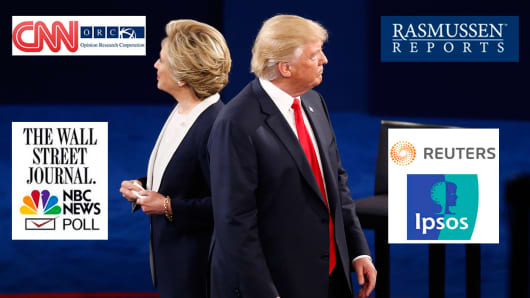There's one word to describe the major national presidential election polls over the last two weeks: "wild."
Just about all of those wild swings in the polls lately have been in favor of Hillary Clinton, as she's now increased her lead from less than one percentage point in the RealClearPolitics poll average to 4.6 points as of Thursday morning.
But there's another word you have to use when you see such massive swings in the polls in just a few days with less than a month to go before Election Day: "baloney." And the reason why they're baloney has nothing to do with conspiracy theories, partisan weighting, or even Russian hacking. It's all about common sense.
The wild poll swings we saw after the first debate and after the Donald Trump "Access Hollywood" tape was leaked were not a straightforward case of Trump did a poor job or Trump looked bad so fewer people now say they'll vote for him. What happens in polling is that, if your candidate does something that makes him or her look bad, or that you don't agree with, you're less likely to want to answer poll questions about him – even if it's anonymous. It doesn't mean you still don't support him. Just that right this minute, you really don't want to talk about it.
This phenomenon was explained in definitive detail by Columbia University statistics Professor Andrew Gellman and Microsoft economist David Rothschild. But do you really need a professor to tell you that when things look bad for your candidate, you don't want to talk about the election at all? Frankly, it's just common sense.
This is important because that kind of attitude affects the very math and research-based work that goes into polling. Pollsters actually identify voters who are the most representative of their district and target them in polls.
Every poll has a list of the top people it wants to survey, but when and if those top people don't respond, the survey's statistical reliability starts to decline. I learned this myself while working part time as a pollster when I got out of college. My bosses gave me a stack of 100 pieces of paper and instructed me that the first person's name on each sheet was the best statistically representative voter to call in each Congressional district. And I was forbidden to go down to even the #2 person until I had called the top name on every one of the 100 pages first. If I even had a few #2 names in my survey, the bosses told me my poll data would not be as reliable for that day.
Based on the embarrassing nature of the "Access Hollywood" tapes, Trump voters have been presented with just the kind of event that makes people want to be more private about their voting choices. And that makes polling go haywire. Clinton thus jumped to a 14-point lead over Trump in the NBC/Wall Street Journal poll on Monday, only to see that lead significantly drop to nine points in the same poll just one day later. That's a 36-percent swing in 24 hours.
The Rasmussen poll had Clinton ahead by seven points on Monday, but Trump took the lead in that poll by Thursday morning by two points, a swing of 128 percent! Yes, that's crazy. But since the "Access Hollywood" story came out, there's been more bad news on Clinton coming out via Wikileaks and many Trump supporters liked his performance in the second debate Sunday night. Put that together and it makes sense that you have more Trump voters willing to be identified, especially by pollsters. And so, the polls are swinging back a little towards Trump. In a week or so, look for the polls to get back very close to where they were before the first Clinton-Trump debate.
The most important thing to note in these poll swings is that the actual voters are really not changing their minds. I think, and history has shown this, that most voters (Ken Bone notwithstanding) had their minds made up by Oct. 1. The crazy numbers are simply representative of which candidate's supporters are responding to the polls more.
This entire scenario is just the latest example of why it's not wise to call this contest over before it's over. You'd think that after the third, fourth, or fifth crazy thing to happen in this election, the "experts" would get that.
I guess not. Should we take another poll?



